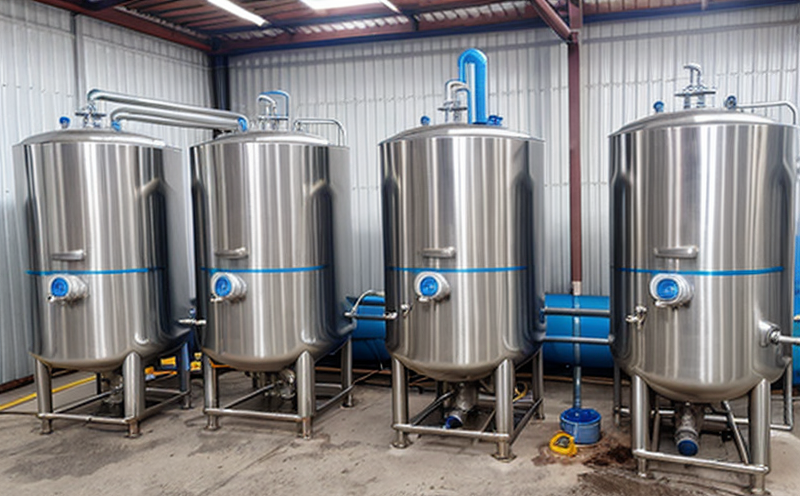ISO 10304-1 Determination of Anions Test in Boiler Water
The determination of anions in boiler water is a critical aspect of maintaining optimal performance and longevity of industrial boilers. This test, governed by ISO 10304-1, is essential for monitoring the quality of boiler water to prevent scaling, corrosion, and other potential issues that can arise from improper water chemistry.
In this service, we utilize advanced analytical techniques to accurately determine anions in boiler water samples. This includes chloride, bromide, iodide, nitrate, nitrite, phosphate, silicate, carbonate, and bicarbonate ions. The test helps in identifying the presence of these anions which are crucial for understanding the chemical composition and ensuring compliance with industry standards.
The process begins with thorough sample preparation, where water samples are collected from various points within the boiler system. These samples are then analyzed using ion chromatography—a method that provides precise quantification of anions present in the water. Ion chromatography is particularly suited for this application due to its ability to separate and detect even trace amounts of these ions.
The test results provide valuable insights into the operational efficiency of the boiler system, enabling proactive maintenance strategies to be implemented. This ensures that the boiler operates within safe parameters, thereby minimizing downtime and preventing costly repairs or replacements.
Our lab adheres strictly to ISO 10304-1 standards for this analysis. These standards outline precise methodologies ensuring consistent and reliable results across all samples analyzed. Compliance with these standards is crucial not only for meeting regulatory requirements but also for maintaining the integrity of industrial operations.
The reliability of our testing services extends beyond mere compliance; it encompasses a commitment to excellence in every aspect of the service we offer. Our team of experts ensures that each sample undergoes rigorous quality control checks, providing accurate and actionable data to our clients.
To summarize, the ISO 10304-1 Determination of Anions Test in Boiler Water is more than just a compliance requirement; it's a cornerstone for maintaining safe and efficient boiler operations. By leveraging this test, industrial facilities can ensure optimal performance while minimizing operational risks associated with water quality.
Applied Standards
| Standard | Description |
|---|---|
| ISO 10304-1:2017 | Determination of anions in water by ion chromatography—Part 1: General principles and procedures. |
| ASTM D859-21 | Standard Test Method for Dissolved Anion Content in Water by Ion Chromatography. |
| EN ISO 7634-1:2010 | Determination of anions in water—Part 1: General principles and procedures. |
Why Choose This Test
The importance of the ISO 10304-1 Determination of Anions Test cannot be overstated. By employing this test, industrial facilities can achieve several significant benefits:
- Improved Boiler Performance: Regular monitoring of anion levels ensures that boiler water remains within optimal parameters, enhancing its operational efficiency.
- Prolonged Equipment Lifespan: Proper management of anions helps prevent scaling and corrosion, reducing the frequency of maintenance activities and extending equipment life.
- Cost Savings: By identifying potential issues early through this test, facilities can avoid costly repairs and replacements. Additionally, reduced downtime translates to increased productivity and profitability.
- Regulatory Compliance: Adherence to industry standards ensures that the facility meets all regulatory requirements, avoiding penalties and fines.
- Safety Assurance: Ensuring optimal water quality in boilers reduces the risk of accidents, thereby enhancing safety within the facility.
In summary, choosing this test is not just about compliance; it's about proactive management of boiler water to ensure safe, efficient, and cost-effective operations. This service is a vital component for any industrial facility looking to maintain high standards in its water management practices.
Use Cases and Application Examples
- Power Plants: Regular monitoring of anions helps prevent scaling in steam generators, ensuring consistent power generation.
- Petrochemical Facilities: Proper boiler water management is crucial for maintaining the integrity of heat exchangers and reactors.
- Manufacturing Industries: This test ensures that boilers used in manufacturing processes operate efficiently without compromising product quality.
- Agricultural Plants: For facilities with large-scale irrigation systems, this test aids in optimizing water usage and preventing equipment damage.
In each of these cases, the ISO 10304-1 Determination of Anions Test plays a pivotal role in maintaining optimal boiler water quality, thereby supporting critical industrial processes. By integrating this service into their maintenance schedules, facilities can achieve a higher level of operational reliability and efficiency.





